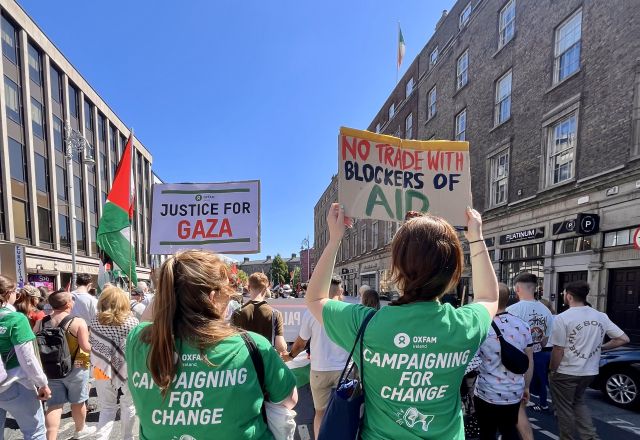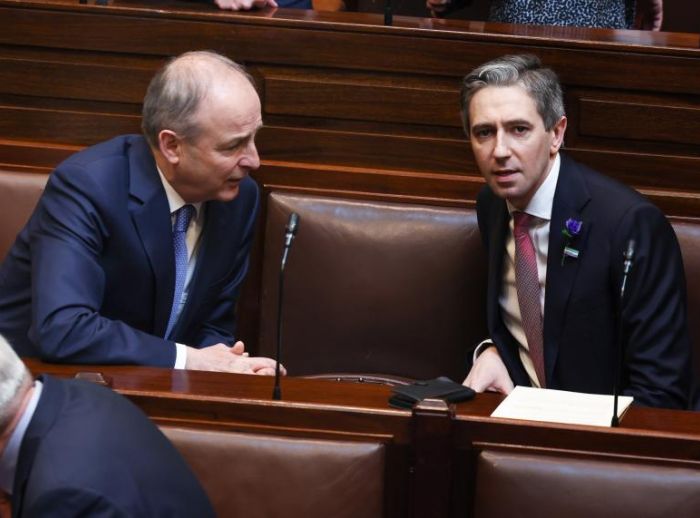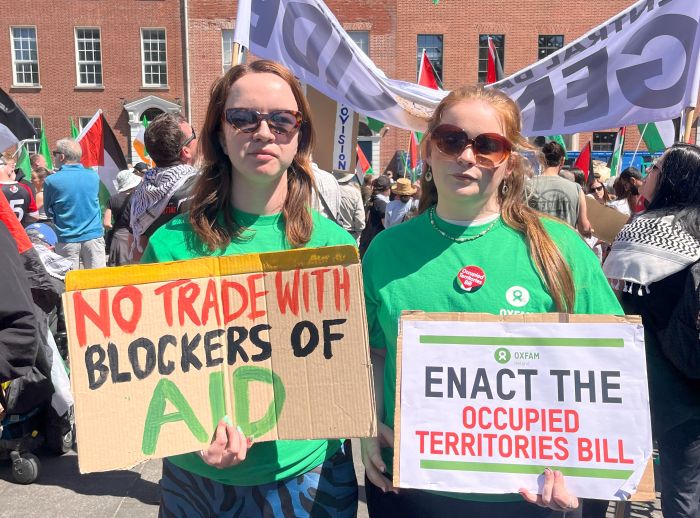
- 4 mins read time
- Published: 29th May 2025
Occupied Territories Bill: Campaigners won’t stop until the ban includes services.
The Government’s version of the Occupied Territories Bill currently bans trade of goods with illegal settlements. Campaigners won’t stop until the ban includes services.
Background
The “Control of Economic Activity (Occupied Territories) Bill” of Ireland was first introduced in 2018.
The Occupied Territories Bill would officially prohibit corporations in Ireland from conducting trade with all illegally occupied territories, including Israeli settlements in the West Bank. If passed, the bill would bar the import of goods and services produced – in whole or in part – in illegal settlements built on occupied Palestinian territory.
Though the bill initially stalled after its introduction, it has gained renewed interest in light of the International Court of Justice (ICJ) advisory opinion, with Irish lawmakers arguing that barring trade with illegal settlements is a necessary step to comply with international law. The bill would not result in a boycott of Israel. It would specifically target trade of goods and services with illegal settlement-based companies.
Government Signals Movement

In May 2025, Tánaiste Simon Harris confirmed that a revised version of the OTB would be brought to Cabinet in June. He stated that the legislation is “well progressed” within the Department of Foreign Affairs and would be presented to ministers shortly.
The revised Government bill is only expected to cover goods and will not include services, such as online services provided by technology companies.
The government has faced consistent criticism from opposition parties and pro-Palestine campaign groups for failing to pass Black’s version of the Occupied Territories bill, which was first introduced in 2018.
The heads – a summary of each section of the legislation – are already at an advance stage and will be published in the coming weeks.T The heads will be sent to the Oireachtas Committee on Foreign Affairs for discussion before the end of June.
At that stage, campaigners are expected to press for the inclusion of services in the bill, which would extend the scope of the legislation considerably.
Legal Debates and Political Tensions
The Government has cited constitutional and EU legal concerns as reasons for the delay, particularly regarding the inclusion of services in the trade ban. However, Green Party leader Roderic O'Gorman has challenged this, stating that the Attorney General did not raise issues with banning services from illegal Israeli settlements.
Opposition parties, including Sinn Féin, have called for the immediate enactment of the OTB, emphasising the urgency of the situation in Gaza. Sinn Féin’s Pearse Doherty has also brought forward a bill focusing on the Central Bank of Ireland’s facilitation of the sale of Israeli bonds. It is titled the ‘Israeli Genocide Bonds’ bill.
Legal Backing
The bill’s legal foundation is bolstered by a 2024 ICJ advisory opinion, which urges nations to prevent trade that supports illegal settlements. Over 400 Irish legal professionals and academics recently signed an open letter to the Government asserting that the legislation could include provisions related to services:
“We do not consider there to be any insurmountable legal obstacles, in either Irish, European or international law, preventing the adoption of legislation prohibiting the import of goods and services produced in the unlawful Israeli settlements in the West Bank. We consider this is the absolute minimum required from the State to comply with its international legal obligations and the holdings of the International Court of Justice.”
In a legal opinion commissioned by campaigners last year, Professor Takis Tridimas, an expert in EU law at Matrix Chambers in London, found that prohibitions on services could be permitted under EU law on grounds of public policy.
His opinion was later cited by Attorney General Rossa Fanning in updated legal advice which permitted the Government to perform a U-turn on the bill.
Public Outcry in Favour of Passing the OTB
Public support for the bill remains strong, with demonstrations across the country and widespread calls for the government to act decisively.
Additionally, a young Irish woman, Sophie Ní Choimín, has begun a hunger strike, vowing not to eat until the OTB becomes law and aid reaches children in Gaza.

Ireland has been a strong alongside Spain, Norway and Slovenia in advocating for a review of the EU’s trade agreement (the ‘EU-Israel Association Agreement’) with Israel, but that 17 countries in May signed a letter seeking such a review.
If Ireland proceeds with a ban on trade with the Occupied Palestinian Territories, it is believed that other countries might then see it is possible.
Oxfam Ireland’s Stance
Oxfam Ireland has consistently advocated for the swift enactment of the Occupied Territories Bill. At the end of January 2025, Oxfam Ireland CEO Jim Clarken urged the government to publish the new legislation without delay, stating:
"Ireland must honour its legal and moral obligations. The Irish people stand firmly with Palestine, and we want no hand, act, or part in illegal settlements."
